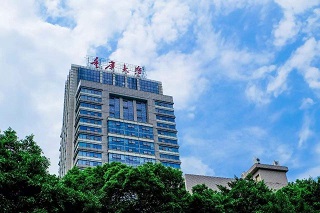【TITLE & POSITION】Doctor of Engineering, Professor at the School of Bioengineering, Doctoral Supervisor, Postdoctoral co-Supervisor, Former deputy director of the Academic Affairs Office of Chongqing University and vice president of the School of Bioengineering.
【ACADEMIC APPOINTMENTS】Committee Member of Steering Committee of Biotechnology and Bioengineering Specialty in Colleges and Universities of Ministry of Education, Committee Member of Steering Committee of Specialty in Colleges and Universities of Sichuan. Chongqing Science and Technology Commissioner. National Engineering Research Center of Solid-state Brewing committee, National and Local Joint Engineering Laboratory for Vascular Implant Development committee. Senior Member of Chinese Society of Biomedical Engineering, CSBME) and Chinese Society of Biotechnology (CSTB). Editorial Board Member of Journal of Biology, Journal of Food Safety and Quality Inspection and Biological Processing Process. Chongqing Academic and technical leader, Chongqing “Bayu scholar” distinguished professor, Chongqing Food Security Promotion Agency, Chongqing Food Safety Standards Committee. Evaluation expert of National High-tech R&D Program of China (863 Program), National Changjiang Scholar and Distinguished Youth Fundation, National Natural Science Foundation of China, China Postdoctoral Science Fundation, Science and Technology Projects in Fujian, Sichuan, Shandong, Guangdong, Guangxi and Chongqing, National Science and Technology Award and Local Science and Technology Award.
【CONTACT INFORMATION】E-mail: huodq@cqu.edu.cn;
Website: http://bio.cqu.edu.cn/info/1018/1160.htm
【WECHAT OFFICIAL ACCOUNT】gh_9970f896784f
【PERSONAL PROFILE】
Dr. Danqun Huo graduated from Chongqing University (Ph.D. in Biomedical engineering, 2004). Chongqing Academic and technical leader, Chongqing “Bayu scholar” distinguished professor. She has presided 5 Projects supported by National Science and Technology Support Program、National High-tech R&D Program of China (863 Program)、and Platform Construction Project of National Engineering Center, 3 Projects supported by National Natural Science Foundation of China (NSFC), 8 Projects supported by China Postdoctoral Science Foundation、Chongqing Science and Technology Commission, and Science and Technology Department of Sichuan Province. She has won Second Prize of Natural Science of Chongqing Science and Technology Award, Second Prize of Natural Science of Wu Wenjun Artificial Intelligence Science and Technology Award, First Prize of Science and Technology of China Light Industry Federation, First Prize of Chongqing Industry-University-Research Innovation Achievement, First and Third Prize of Chongqing Teaching Achievements. She has instructed undergraduates to participate in national competitions and won the first and second prizes, she has instructed graduate students to participate in Challenge Cup competition and won the Chongqing Gold. She has won the title of excellent instructor for "internet plus" college students' innovation and entrepreneurship youth red dream journey. She has published more than 150 papers (cited more than 2,000 times) in journals such as Biosensors and Bioelectronics; Small; ACS Sensors etc. Many papers were selected as research highlight articles of journals, relevant achievements have been highlighted by the American Association for the Advancement of Science (AAAS) and the American Physical Chemistry Association, or highlighted by media such as Sina, Netease, Tencent, People's Daily Online, World Wide Web, etc. Moreover, she has applied and obtained more than 40 patents of inventions (8 of them have been transformed or applied). Current courses taught by Dr. Huo include 《Biochemical Engineering》,《Fermentation Engineering and Technology》,《Development and Utilization of Microbial Resources》,《Nanometer Medical Materials and Instruments》 etc. She has supervised more than 40 master students and 20 Ph.D. students, 5 of whom have won the Chongqing Distinguished Master/Doctorial Thesis prize.
【RESEARCH INTERESTS】
1. Development and utilization of microbial resources: application of functional microorganisms with high biological activity, microecological agents, functional microorganisms, functional food fermentation mechanism and environmental microorganisms in waste water treatment.
2. Research on new technology of biological detection: new methods and technologies for rapid and convenient detection of microbial functional genes, bioactive components and restrictive additives in food.
3. Nano-biomaterials and biochips: biochips based on Nucleic acid/immune technology, miRNA/DNA materials, biological enzymes/quantum dots, nano-gold /MOF, etc. New method based on gene editing/biological nanoprobe to study cell metabolism related to major diseases. Pesticide and veterinary drug residues, heavy metal ion detection, etc.
【REPRESENTATIVE PUBLICATIONS】
1. Jing Bao, Danqun Huo, Changjun Hou, etc. Carbon nanomaze for biomolecular detection with zeptomolar sensitivity. Advanced Functional Materials 2020, 2006521. (IF=16.863)
2. Jing Bao, Changjun Hou, Lei Yu, etc. ELP-OPH/BSA/TiO2 nanofibers/c-MWCNTs based biosensor for sensitive and selective determination of p-nitrophenyl substituted organophosphate pesticides in aqueous system, Biosensors and Bioelectronics 2016, 85, 935-942. (IF=10.257)
3. Yuchan Zhang, Liang Su, Dan Manuzzib, Honorio Valdés Espinosadelos Monterosb, Wenzhao Jia, Danqun Huo, Changjun Hou, Lei Yu. Ultrasensitive and selective non-enzymatic glucose detection using copper nanowires. Biosensors and Bioelectronics 2012,31(1): 426-432. (IF=10.257)
4. Xiaolong Chen, Danqun Huo, Faliang Xu, Changjun Hou, etc. A methodology for ultrasensitive detection of sequence-specific DNA or uracil-DNA glycosylase activity. ACS Sensors 2020, 5(6), 1615-1623. (IF=7.333)
5. Xiang Chu, Xiaofeng Wu, Hua Feng, Hengli Zhao, Yan Tan, Liting Wang, Haiying Ran, Liang Yi, Yan Peng, Haipeng Tong, Rui Liu, Wei Bai, Huiwen Shi, Lei Li, Danqun Huo. Coupling Between Interleukin-1R1 and Necrosome Complex Involves in Hemin-Induced Neuronal Necroptosis After Intracranial Hemorrhage. Stroke, 2018;49:2473–2482. (IF= 7.190)
